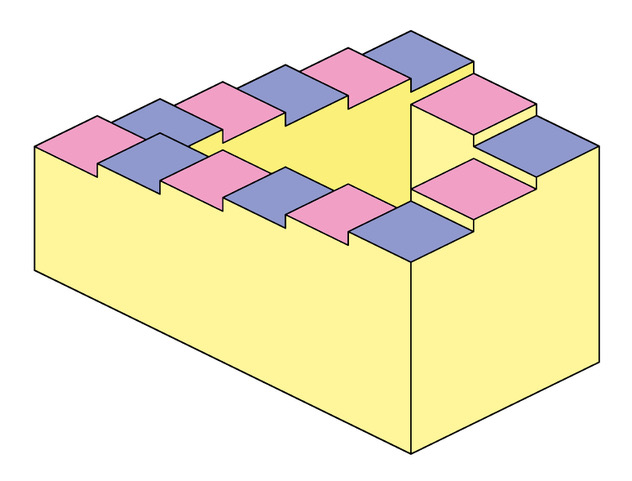
M.C. Escher, a Dutch graphic designer/artist born 120 years ago – he keeps going viral on social media and almost has pop star status. Who doesn’t know his graphics? Impossible perspectives, metamorphoses and optical illusions are the programme in his pictures and an almost endlessly repeated theme. A brilliant visionary!
But the interesting thing is that there are not only graphics of impossibilities and metamorphoses, there are also terms and phrases that, on closer inspection, turn out to be deceptions or (on closer scrutiny) sometimes even change their meaning several times, as in a metamorphosis. Would you like a small example to try? Ok …
Let’s start with a department store or a public authority and the “complaints office” located in the basement. To understand the example, you don’t need to have been there, it’s enough that you know there are such complaint offices and the way there is usually signposted with a reference to it (also, nowadays they are usually no longer called complaint offices, but “Customer Concern Centres” or the like). In reality, people go there who have had an issue with goods, services or the organisation’s staff and are looking for a solution. Working in the complaints office is usually not that much fun, because the visitors are agitated, loud and sometimes even really nasty. They insult the employee, although he/she has done nothing wrong and actually just wants to help the people. He/she explains the situation to them and shows them new, further ways of solving the problem.
But often the visitors are not satisfied, they don’t want further explanations or a hint at the small print, they ONLY want a solution. And already we see the paradox: people do not go to a complaints office to “bellyache”, NO – quite the opposite, they go to the complaints office to be relieved! They simply want to get rid of this, for them, annoying and superfluous issue – and thus relieve themselves. What a nice word paradox – a complaints office for self-relief! Which, by the way, in the broader sense of the word, has certainly already happened, could happen or will happen in practice in a complaints office.
After this intuitive, more emotional introduction to a central aspect of today’s topic (you can still feel the paradox of the complaints office), we come to the actual topic of this article. What does the term RESPECT actually mean?
Respect is a term straight out of a hall of mirrors. A tiny change of viewpoint and the picture that was just clear a moment ago slides into the absurd. You don’t believe me? Then follow the harlequins on their search for the kaleidoscopic meaning of the word respect.
Let’s start with a look at the dictionary: according to that, respect means ‘looking again’ as a literal translation of the Latin respectio and thus refers to the repeated observation and thorough assessment of a new impression in order to correct the narrowness and superficiality of the first viewing. Only after critical appraisal and reflection of the first impression does one arrive at an appreciative assessment and thus at respect.

Oh dear, that would mean that respect would be directly connected with invested time and effort, apparently you would have to do the same thing several times? And this in a time when almost everyone is trying to save time – among other things, with the unhealthy but time-saving diet of instant sauces and frozen pizza. In the food sector, unfortunately, we also have no respect for the abomination of factory farming, instead we eat a chicken kebab for €1.99 – and ignore the chickens abused for it. It was only for a quick nibble in between, after all.
Where has respect gone? Have we just forgotten its meaning or is this term really a paradox, as in Escher’s work?
There is a broad understanding of respect that is more like a one-way street. The expected respect for elders is quite common in our society, in Asia it is even a social obligation. On the other hand, I miss the same respect from society towards children, especially the very young. When I think of the awful language we use on babies and toddlers, I ask myself what happened to adults’ respect for infants is. (There is a wonderful book with cartoons by Loriot on this topic).
I observe the same effect with the height of adults. A physical giant of more than 2 metres “commands respect” – the only 1.32 metre small Ms Haller/Alberich in the Münster “Tatort” crime series has to earn it with repartee. In the press, this role is praised as a contribution to the rehabilitation of people of short stature – that doesn’t sound like “respect” for starters. Why is there respect for “being particularly tall” and not for “being particularly short”?
However, things get really entertaining when you start collecting synonyms for respect from family members and friends, preferably also from people with an immigration background. They have yet another turn in the kaleidoscope for this term. But first let’s take the aspect of gratitude. Paying respect to someone for something is another way of saying you are grateful. And that is so important, because gratitude and respect hold a community together. One of the founding fathers of sociology, George Simmel, said that gratitude creates a bond of interaction between taking and giving – where other means fail.
In modern companies, guiding principles are formulated for employees, business standards are defined for management and customer benefits are explained. Just imagine if everyone had just a little more respect and gratitude for each other? Then we could save a lot of paper and work, and everyone would benefit. I plead for more respect instead of more mission & vision and even more advertising and marketing.
Just as a “sorry” after a mistake is a sign of respect for the other, a “thank you” is also a signal of personal respect. A thank you never misses its mark. The English philosopher Francis Bacon summed it up when he said that it is not the happy who are grateful, but the grateful who are happy.
Ultimately, we are all elements of a cycle: those who experience respect also pass it on to other fellow human beings. And those who think positively also infect their fellow human beings. Many people are not always aware of what this triggers in us – but it works. Yes, respect has somehow been lost. But it doesn’t have to stay that way!
Thank you for taking the time to read this article.
Original text: UTO
English translation: BCO
Bildquellen
- M.C. Schwer 1 – public release: public release
- M.C. Schwer 2 – public release: public release

